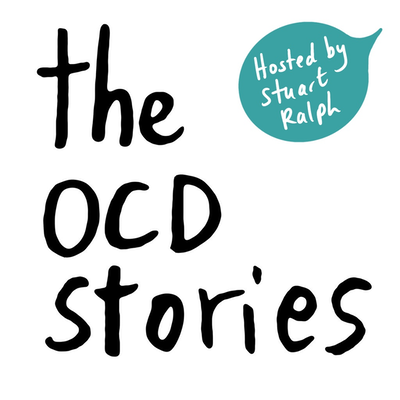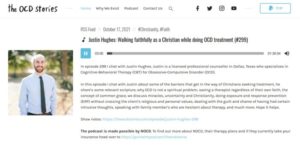
I once again joined host Stuart Ralph in the OCD Stories podcast. My prior one, “Faith, Spirituality and Religion in OCD Therapy” (#250), led us to go even deeper into the topic, specifically for Christians who have OCD. These bullet points are a very rough draft of what we covered. Here it is:
Justin Hughes: Walking faithfully as a Christian while doing OCD treatment (#299)
Intro and Overview
-
- OCD touches on spiritual issues but is not per se a spiritual problem. Why? We cover that.
- I believe Christians can do ERP and medications and walk congruently with their faith. I stated this in a video recently released in the OCD and Faith campaign by the IOCDF: “I believe you can be a part of a faith community and receive mental health treatment.”
- There are many strengths and barriers that come up for Christians in OCD therapy- some common and some unique- pertaining to Christian faith in OCD treatment.
- My hope for you, the reader, is that of Paul in 2 Corinthians 1:3-4: “Blessed by the…God of all comfort, who comforts us in all our affliction, so that we may be able to comfort those who are in any affliction.”
- OCD touches on spiritual issues but is not per se a spiritual problem. Why? We cover that.
Key Barriers
-
- The Big One, per Micah Howe, and I agree:
- “Everything grows from this presupposition that anxiety is a spiritual problem with a spiritual solution. Resistance grows out of that presupposition that is misinformed.”
- Ted Witzig says, “Because the symptoms of scrupulosity involve spiritual concerns, it is often mistaken for a spiritual problem.”
- We have Christian leadership on every end saying different things:
- Totally spiritual
- Involves some physical things, but it’s mostly dealt with spiritually
- It’s a mix of spiritual and physical
- It’s dealt with only physically
Common Issues for Christians
-
- Is my faith weak, or worse, is it a sign of lack of faith to pursue treatment?
-
-
-
-
-
- Or if I’m fully trusting Jesus I don’t need medication or therapy
- Per Shelley of OCDHopeMovement on Instagram, a core question she hears asked by believers in Christ towards the person with OCD: “Where is your faith and trust in God?”
-
-
-
- “Christian Intolerance of uncertainty”– this is not Biblical- but it can be very severe, particularly in my own tradition of a Protestant / Evangelical background. It’s like there can’t not be an answer found in the Bible, which I argue is ironically, not Biblical.
-
-
-
-
- All people dislike uncertainty- where it targets us. Christians it often targets faith.
- People gravitate towards certitude, and sometimes the person who has the strongest, most certain voice is an extreme person. Think of the cult leader or whoever is popping into your mind right now- who says they know the answers, but are just as uncertain as the rest of us.
-
-
-
-
- Seeing a secular therapist who doesn’t share their faith if that’s the best they can do (https://www.accounseling.org/four-things-christians-seeking-ocd-treatment-are-looking-for/). This will sound wild to many Christians, but if you have OCD, and especially if it’s more than mild OCD, I would rather most Christians see a therapist who simply approaches it scientifically through ERP and doesn’t emphasize faith in any way than to see someone who emphasizes faith and doesn’t support the work of ERP.
- Christians often fear that therapy will somehow deconstruct their faith and can be very insular in seeking help. Frankly, I don’t think this is much different from other various cultural barriers (some cultures see counseling as weak, medications as harmful, and so forth).
- I can’t always blame my fellows on this one. Look at the “founding fathers and mothers” of modern psychology:
- Albert Ellis
- Sigmund Freud
- I can’t always blame my fellows on this one. Look at the “founding fathers and mothers” of modern psychology:
-
-
- Can a Christian be healed of OCD?
-
-
-
-
-
- Yes, but… can a Christian be healed of cancer? Yes. But base your steps on the larger picture- God doesn’t promise us we won’t face trials, suffering, and tribulation. In fact, the opposite is promised.
-
-
-
- How do I talk to my family (or church friends) who shame me for taking medication or seeing a therapist?
- What is the role of Christian faith in OCD treatment?
- Not to sound minimizing, but frankly, it’s the same as in everything else. Faith in Christ- and this is lived out in a lot of similar and different ways.
- What is the role of Christian faith in OCD treatment?
-
Key Opportunities for Christians
-
- Level of commitment. At first, many Christian clients’ hesitations and guardedness towards treatment actually starts from something inherently good and strong- an utmost commitment that they are actually willing to suffer and stay there rather than violate their faith. I respect that.
- I see a lot of churches doing mental health well. My church is an example to me.
- I think there will never be enough clinicians to help the suffering that exists. The church is and can always be on the front lines. They were before medicine was relegated to professionals and someone had to step in and care for the sick. Let’s do that with mental health.
- Faith Leaders Guide: clergy are sought out 50% more than doctors!
- Christian counseling often has a bio-pysho-social-spiritual model of looking at problems and solutions, which already can be more robust than when we check certain topics at the door.
- Common grace (medication, therapy, etc.). Rain falls on everyone. Paul to Timothy- take some wine for your stomach (Jon Seidl).
- We have amazing hope in suffering.
- Some really key research examines how religious and sexual obsessions (which are subtypes most commonly experienced in scrupulosity) often need more cognitive work to be successful in its treatment.
- Particularly in scrupulosity, we need to keep exploring ways to uniquely tailor treatment to these intrusive, unacceptable thoughts. For example:
- “Whereas sexual obsessions were predicted only by increased beliefs about the importance and control of thoughts, and contamination obsessions were predicted only by inflated responsibility appraisals and threat estimation, religious obsessions were independently predicted by both of these constructs.” (Siev et al., 2014)
- We need to be looking at the role of addressing our thoughts and beliefs in scrupulosity in particularly, b/c they can strongly maintain OCD.
- Can’t think bad thoughts.
- Do I need to repent?
- Do I really believe?
- Is God real?
- Is this a sin?
- If I die without repenting will I go to hell?
- Christians need to hear that they can go to a secular therapist / medication and get benefit.
- Christians also need validation that there of course will be clinicians who don’t honor their beliefs/values, and it’s okay to look around and ask good questions up front. Ted Witzig, in his now semi-famous presentation through the IOCDF, says several key things about problems with therapists not honoring faith values:
- “Classic example I see is with others who either a) didn’t do enough assessment or b) the client wasn’t assertive enough who prescribed an exposure that conflicted with their values. To be fair, every exposure will feel like it conflicts with values at some point- or else it would be an exposure. But we always want to assess whether it is a true conflict and what to do. There are often multiple ways to face a fear, and violating an enduring principle or value is not one of them.”
- Christians also need validation that there of course will be clinicians who don’t honor their beliefs/values, and it’s okay to look around and ask good questions up front. Ted Witzig, in his now semi-famous presentation through the IOCDF, says several key things about problems with therapists not honoring faith values:
- You DON’T have to do exposures to things that violate your faith.
- e.g.,
- Ouija board usage
- Mentally “yelling” blasphemous things during a worship service.
- e.g.,
Helpful Resources
-
- What resources are there for faith and OCD?
Ending Thoughts
-
- Sometimes, I believe, trusting and obeying Jesus means:
- Do the clear things faith in Jesus requires (prayer, serving, forgiving, obeying, etc.).
- Do your ERP, where indicated.
- Take meds, where indicated.
- Go to an IOCDF conference.
- Listen to the OCD Stories.
- Sometimes, I believe, trusting and obeying Jesus means:










Leave a Reply